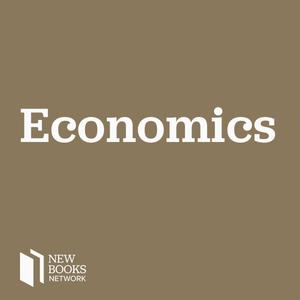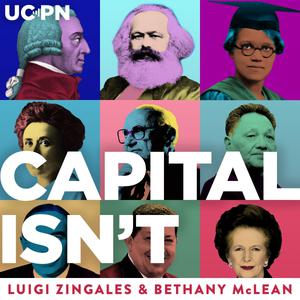
New Books in Economics
Interviews with Economists about their New Books
- 24 minutes 23 secondsIndia’s Land Mafia: A Discussion with Chiara Arnavas
Who and what are India’s land mafia? How do they operate, and why have they become so crucial to India’s land market? In this episode, we are joined by Chiara Arnavas for a discussion on the emergence over the past decades of a dynamic Indian land mafia that is centrally involved in moving land around, freeing it up for new uses, and passing it onto other actors for mega-profits. We analyze how the land mafia works, and what the implications are for social inequalities along the lines of class, caste, gender, and religion.
Chiara Arnavas is a Doctoral Research Fellow at the University of Oslo
Your host Kenneth Bo Nielsen is a social anthropologist and the leader of the Centre for South Asian Democracy at the University of Oslo.
Learn more about your ad choices. Visit megaphone.fm/adchoices
Support our show by becoming a premium member! https://newbooksnetwork.supportingcast.fm/economics
24 January 2025, 9:00 am - 39 minutes 25 secondsDuncan Mavin, "Meltdown: Scandal, Sleaze and the Collapse of Credit Suisse" (Pegasus Books, 2024)
Meltdown: Scandal, Sleaze and the Collapse of Credit Suisse (Pegasus Books, 2024) is a great business history book. It meticulously chronicles the story of a large and once revered Swiss Bank, Credit Suisse, from its foundation in 1856 until how a series of scandals, driven by a culture of greed and entitlement among its bankers, led to the bank´s ultimate collapses in March 2023. The narrative also explores the bank's international expansion, particularly its partnership with First Boston in the United States.
Meltdown is not just a history of Credit Suisse but a broader investigation into the systemic issues of greed, lies, and ambition that plague the financial industry. It raises critical questions about the future of big banks in a world where transparency and accountability are increasingly demanded.
Learn more about your ad choices. Visit megaphone.fm/adchoices
Support our show by becoming a premium member! https://newbooksnetwork.supportingcast.fm/economics
19 January 2025, 9:00 am - 45 minutes 5 secondsDevin Fergus, “Land of the Fee: Hidden Costs and the Decline of the American Middle Class” (Oxford UP, 2018)
Politicians, economists, and the media have put forth no shortage of explanations for the mounting problem of wealth inequality – a loss of working class jobs, a rise in finance-driven speculative capitalism, and a surge of tax policy decisions that benefit the ultra-rich, among others. While these arguments focus on the macro problems that contribute to growing inequality, they overlook one innocuous but substantial contributor to the widening divide: the explosion of fees accompanying virtually every transaction that people make.
As Devin Fergus, Arvarh E. Strickland Distinguished Professor of History, Black Studies, and Public Affairs at the University of Missouri, shows in Land of the Fee: Hidden Costs and the Decline of the American Middle Class (Oxford University Press, 2018), these perfectly legal fees are buried deep within the verbose agreements between vendors and consumers – agreements that few people fully read or comprehend. The end effect, Fergus argues, is a massive transfer of wealth from the many to the few: large banking corporations, airlines, corporate hotel chains, and other entities of vast wealth. Fergus traces the fee system from its origins in the deregulatory wave of the late 1970s to the present, placing the development within the larger context of escalating income inequality. He organizes the book around four of the basics of existence: housing, work, transportation, and schooling. In each category, industry lobbyists successfully influenced legislatures into transforming the law until surreptitious fees became the norm.
The average consumer is now subject to a dizzying array of charges in areas like mortgage contracts, banking transactions, auto insurance rates, college payments, and payday loans. The fees that accompany these transactions are not subject to usury laws and have effectively redistributed wealth from the lower and middle classes to ultra-wealthy corporations and the individuals at their pinnacles. By exposing this predatory and nearly invisible system of fees, Land of the Fee will reshape our understanding of wealth inequality in America.
Learn more about your ad choices. Visit megaphone.fm/adchoices
Support our show by becoming a premium member! https://newbooksnetwork.supportingcast.fm/economics
5 January 2025, 9:00 am - 1 hour 27 minutesAustin Dean, "China and the End of Global Silver, 1873–1937" (Cornell UP, 2020)
In the late nineteenth century, as much of the world adopted some variant of the gold standard, China remained the most populous country still using silver. Yet China had no unified national currency; there was not one monetary standard but many. Silver coins circulated alongside chunks of silver and every transaction became an "encounter of wits." China and the End of Global Silver, 1873–1937 (Cornell UP, 2020) focuses on how officials, policy makers, bankers, merchants, academics, and journalists in China and around the world answered a simple question: how should China change its monetary system? Far from a narrow, technical issue, Chinese monetary reform is a dramatic story full of political revolutions, economic depressions, chance, and contingency. As different governments in China attempted to create a unified monetary standard in the late nineteenth and early twentieth century, the United States, England, and Japan tried to shape the direction of Chinese monetary reform for their own benefit.
Austin Dean argues convincingly that the Silver Era in world history ended owing to the interaction of imperial competition in East Asia and the state-building projects of different governments in China. When the Nationalist government of China went off the silver standard in 1935, it marked a key moment not just in Chinese history but in world history.
Austin Dean is Assistant Professor of History at the University of Nevada, Las Vegas. His work has appeared in Modern China and the Journal of American-East Asian Relations. He is on twitter @thelicentiate.
Ghassan Moazzin is an Assistant Professor at the Hong Kong Institute for the Humanities and Social Sciences and the Department of History at the University of Hong Kong. He works on the economic and business history of 19th and 20th century China, with a particular focus on the history of foreign banking, international finance and electricity in modern China. His first book, tentatively titled Foreign Banks and Global Finance in Modern China: Banking on the Chinese Frontier, 1870–1919, is forthcoming with Cambridge University Press.
Learn more about your ad choices. Visit megaphone.fm/adchoices
Support our show by becoming a premium member! https://newbooksnetwork.supportingcast.fm/economics
5 January 2025, 9:00 am - 1 hour 12 minutesSwethaa S. Ballakrishnen, "Accidental Feminism: Gender Parity and Selective Mobility Among India’s Professional Elite" (Princeton UP, 2021)
In India, elite law firms offer a surprising oasis for women within a hostile, predominantly male industry. Less than 10 percent of the country's lawyers are female, but women in the most prestigious firms are significantly represented both at entry and partnership. Elite workspaces are notorious for being unfriendly to new actors, so what allows for aberration in certain workspaces?
Drawing from observations and interviews with more than 130 elite professionals, Accidental Feminism: Gender Parity and Selective Mobility Among India’s Professional Elite (Princeton UP, 2021) examines how a range of underlying mechanisms-gendered socialization and essentialism, family structures and dynamics, and firm and regulatory histories-afford certain professionals egalitarian outcomes that are not available to their local and global peers. Juxtaposing findings on the legal profession with those on elite consulting firms, Swethaa Ballakrishnen reveals that parity arises not from a commitment to create feminist organizations, but from structural factors that incidentally come together to do gender differently. Simultaneously, their research offers notes of caution: while conditional convergence may create equality in ways that more targeted endeavors fail to achieve, "accidental" developments are hard to replicate, and are, in this case, buttressed by embedded inequalities. Ballakrishnen examines whether gender parity produced without institutional sanction should still be considered feminist.
In offering new ways to think about equality movements and outcomes, Accidental Feminism forces readers to critically consider the work of intention in progress narratives.
Noopur Raval is a postdoctoral researcher working at the intersection of Information Studies, STS, Media Studies and Anthropology.
Learn more about your ad choices. Visit megaphone.fm/adchoices
Support our show by becoming a premium member! https://newbooksnetwork.supportingcast.fm/economics
3 January 2025, 9:00 am - 27 minutes 33 secondsEnze Han, "The Ripple Effect: China's Complex Presence in Southeast Asia" (Oxford UP, 2024)
Many studies of China's relations with and influence on Southeast Asia tend to focus on how Beijing has used its power asymmetry to achieve regional influence. Yet, scholars and pundits often fail to appreciate the complexity of the contemporary Chinese state and society, and just how fragmented, decentralized, and internationalized China is today.
In The Ripple Effect: China's Complex Presence in Southeast Asia (Oxford UP, 2024), Enze Han argues that a focus on the Chinese state alone is not sufficient for a comprehensive understanding of China's influence in Southeast Asia. Instead, we must look beyond the Chinese state, to non-state actors from China, such as private businesses and Chinese migrants. These actors affect people's perception of China in a variety of ways, and they often have wide-ranging as well as long-lasting effects on bilateral relations. Looking beyond the Chinese state's intentional influence reveals many situations that result in unanticipated changes in Southeast Asia. Han proposes that to understand this increasingly globalized China, we need more conceptual flexibility regarding which Chinese actors are important to China's relations, and how they wield this influence, whether intentional or not.
The Ripple Effect makes the case that to understand China's relationship with Southeast Asia, it is necessary to move beyond a narrow fixation on the Chinese state by scrutinizing the ordinary manifestations of China's presence in the region and recognizing the multifaceted web of actors and their effects on the dynamics between the two regions.
Enze Han is an associate professor of politics at the University of Hong Kong. He works on the international relations of East Asia, Southeast Asian politics and China-Southeast Asia relations. This is his third single-authored book from Oxford University Press.
Enze is in conversation with Duncan McCargo, President's Chair in Global Affairs at Nanyang Technological University and one of the hosts on New Books in Southeast Asian Studies. Duncan's recent co-authored article on the relationship between Thai politics and attitudes to China, mentioned during the podcast, may be found here.
Learn more about your ad choices. Visit megaphone.fm/adchoices
Support our show by becoming a premium member! https://newbooksnetwork.supportingcast.fm/economics
26 December 2024, 9:00 am - 40 minutes 5 secondsLeah Downey, "Our Money: Monetary Policy as If Democracy Matters" (Princeton UP, 2024)
How the creation of money and monetary policy can be more democratic.
The power to create money is foundational to the state. In the United States, that power has been largely delegated to private banks governed by an independent central bank. Putting monetary policy in the hands of a set of insulated, nonelected experts has fueled the popular rejection of expertise as well as a widespread dissatisfaction with democratically elected officials.
In Our Money: Monetary Policy as If Democracy Matters (Princeton UP, 2024), Leah Downey makes a principled case against central bank independence (CBI) by both challenging the economic theory behind it and developing a democratic rationale for sustaining the power of the legislature to determine who can create money and on what terms. How states govern money creation has an impact on the capacity of the people and their elected officials to steer policy over time. In a healthy democracy, Downey argues, the balance of power over money creation matters.
Downey applies and develops democratic theory through an exploration of monetary policy. In so doing, she develops a novel theory of independent agencies in the context of democratic government, arguing that states can employ expertise without being ruled by experts. Downey argues that it is through iterative governance, the legislature knowing and regularly showing its power over policy, that the people can retain their democratic power to guide policy in the modern state. As for contemporary macroeconomic arguments in defense of central bank independence, Downey suggests that the purported economic benefits do not outweigh the democratic costs.
Learn more about your ad choices. Visit megaphone.fm/adchoices
Support our show by becoming a premium member! https://newbooksnetwork.supportingcast.fm/economics
25 December 2024, 9:00 am - 50 minutes 10 secondsChristine M. Larson, "Love in the Time of Self-Publishing: How Romance Writers Changed the Rules of Writing and Success" (Princeton UP, 2024)
As writers, musicians, online content creators, and other independent workers fight for better labor terms, romance authors offer a powerful example—and a cautionary tale—about self-organization and mutual aid in the digital economy.
In Love in the Time of Self-Publishing: How Romance Writers Changed the Rules of Writing and Success (Princeton University Press, 2024), Dr. Christine Larson traces the forty-year history of Romancelandia, a sprawling network of romance authors, readers, editors, and others, who formed a unique community based on openness and collective support. Empowered by solidarity, American romance writers—once disparaged literary outcasts—became digital publishing’s most innovative and successful authors. Meanwhile, a new surge of social media activism called attention to Romancelandia’s historic exclusion of romance authors of color and LGBTQ+ writers, forcing a long-overdue cultural reckoning.
Drawing on the largest-known survey of any literary genre as well as interviews and archival research, Dr. Larson shows how romance writers became the only authors in America to make money from the rise of ebooks—increasing their median income by 73 percent while other authors’ plunged by 40 percent. The success of romance writers, Larson argues, demonstrates the power of alternative forms of organizing influenced by gendered working patterns. It also shows how networks of relationships can amplify—or mute—certain voices.
Romancelandia’s experience, Dr. Larson says, offers crucial lessons about solidarity for creators and other isolated workers in an increasingly risky employment world. Romancelandia’s rise and near-meltdown shows that gaining fair treatment from platforms depends on creator solidarity—but creator solidarity, in turn, depends on fair treatment of all members.
This interview was conducted by Dr. Miranda Melcher whose new book focuses on post-conflict military integration, understanding treaty negotiation and implementation in civil war contexts, with qualitative analysis of the Angolan and Mozambican civil wars.
Learn more about your ad choices. Visit megaphone.fm/adchoices
Support our show by becoming a premium member! https://newbooksnetwork.supportingcast.fm/economics
24 December 2024, 9:00 am - 1 hour 30 minutesMatt Beane, "The Skill Code: How to Save Human Ability in an Age of Intelligent Machines" (HarperCollins, 2024)
As part of our informal series on artificial intelligence, Peoples & Things host, Lee Vinsel, talks with Matt Beane, Assistant Professor of Technology Management at the University of California, Santa Barbara, about his book The Skill Code: How to Save Human Ability in the Age of Intelligent Machines (HarperCollins, 2024).
Beane outlines the fascinating forms of research he did - both his own ethnographic work and reanalyzing the data of other ethnographers - to better understand how automating technologies are being adopted in organizational settings and how such adoption may threaten traditional mentor-mentee relationships through which junior workers learn crucial skills. Beane also discusses ways in which the worst negative skill-learning outcomes may be avoided and his own work trying to create new training systems to improve our current situation.
Learn more about your ad choices. Visit megaphone.fm/adchoices
Support our show by becoming a premium member! https://newbooksnetwork.supportingcast.fm/economics
23 December 2024, 9:00 am - 51 minutes 35 secondsPinelopi Koujianou Goldberg, "The Unequal Effects of Globalization" (MIT, 2023)
The recent retreat from globalization has been triggered by a perception that increased competition from global trade is not fair and leads to increased inequality within countries. Is this phenomenon a small hiccup in the overall wave of globalization, or are we at the beginning of a new era of deglobalization? Former Chief Economist of the World Bank Group Pinelopi Koujianou Goldberg tells us that the answer depends on the policy choices we make, and in The Unequal Effects of Globalization (MIT Press, 2023), she calls for exploring alternative policy approaches including place-based policies, while sustaining international cooperation.
At this critical moment of shifting attitudes toward globalization, The Unequal Effects of Globalization enters the debate while also taking a step back. Goldberg investigates globalization's many dimensions, disruptions, and complex interactions, from the late twentieth century's wave of trade liberalizations to the rise of China, the decline of manufacturing in advanced economies, and the recent effects of trade on global poverty, inequality, labor markets, and firm dynamics. From there, Goldberg explores the significance of the recent backlash against and potential retreat from globalization and considers the key policy implications of these trends and emerging dynamics.
As comprehensive as it is well-balanced, The Unequal Effects of Globalization is an essential read on trade and cooperation between nations that will appeal as much to academics and policymakers as it will to general readers who are interested in learning more about this timely subject.
Pinelopi (Penny) Koujianou Goldberg is the Elihu Professor of Economics and Global Affairs and an Affiliate of the Economic Growth Center at Yale University. She holds a joint appointment at the Yale Department of Economics and the Jackson School of Global Affairs. From 2018 to 2020, she was the Chief Economist of the World Bank Group. Goldberg was President of the Econometric Society in 2021 and has previously served as Vice-President of the American Economic Association. From 2011-2017 she was Editor-in-Chief of the American Economic Review. She is member of the National Academy of Sciences and the American Academy of Arts and Sciences, recipient of Guggenheim Memorial Foundation and Sloan Research Fellowships, and recipient of the Bodossaki Prize in Social Sciences. She is also a Distinguished Fellow of the Centre for Economic Policy Research (CEPR), research associate at the National Bureau of Economics Research (NBER), research fellow at the Institute for Fiscal Studies (IFS) in London, UK, fellow of the CESifo research network in Germany, and member of the board of directors of the Bureau of Research and Economic Analysis of Development (BREAD).
Interviewer Peter Lorentzen is an Associate Professor of Economics at the University of San Francisco, a nonresident scholar at the UCSD 21st Century China Center, an alumnus of the Public Intellectuals Program of the National Committee on US-China Relations, and is currently a visiting scholar at the Stanford Center on China’s Economy and Institutions. His research focuses on the economics of information, incentives, and institutions, primarily as applied to the development and governance of China. He created the unique Master’s of Science in Applied Economics at the University of San Francisco, which teaches the conceptual frameworks and practical data analytics skills needed to succeed in the digital economy.
Learn more about your ad choices. Visit megaphone.fm/adchoices
Support our show by becoming a premium member! https://newbooksnetwork.supportingcast.fm/economics
22 December 2024, 9:00 am - 1 hour 2 minutesUlises Ali Mejias and Nick Couldry, "Data Grab: The New Colonialism of Big Tech and How to Fight Back" (U Chicago Press, 2024)
In the present day, Big Tech is extracting resources from us, transferring and centralizing resources from people to companies. These companies are grabbing our most basic natural resources--our data--exploiting our labor and connections, and repackaging our information to control our views, track our movements, record our conversations, and discriminate against us. These companies tell us this is for our own good, to build innovation and develop new technology. But in fact, every time we unthinkingly click "Accept" on a set of Terms and Conditions, we allow our most personal information to be kept indefinitely, repackaged by companies to control and exploit us for their own profit.
In Data Grab: The New Colonialism of Big Tech and How to Fight Back (The University of Chicago Press, 2024), Ulises Mejias and Nick Couldry explain why postindustrial capitalism cannot be understood without colonialism, and why race is a critical factor in who benefits from data colonialism, just as it was for historic colonialism. In this searing, cutting-edge guide, Mejias and Couldry explore the concept of data colonialism, revealing how history can help us understand the emerging future--and how we can fight back.
Mention in this episode: Tierra Comun (English Version)
Ulises A. Mejias is professor of communication studies at the State University of New York at Oswego.
Nick Couldry is professor of media, communications, and social theory at the London School of Economics and Political Science and faculty associate at Harvard University’s Berkman Klein Center for Internet and Society.
Dr. Michael LaMagna is the Information Literacy Program & Library Services Coordinator and Professor of Library Services at Delaware County Community College.
Learn more about your ad choices. Visit megaphone.fm/adchoices
Support our show by becoming a premium member! https://newbooksnetwork.supportingcast.fm/economics
21 December 2024, 9:00 am - More Episodes? Get the App
Your feedback is valuable to us. Should you encounter any bugs, glitches, lack of functionality or other problems, please email us on [email protected] or join Moon.FM Telegram Group where you can talk directly to the dev team who are happy to answer any queries.
 ChinaTalk
ChinaTalk
 Capitalisn't
Capitalisn't
 Politics Theory Other
Politics Theory Other
 Ones and Tooze
Ones and Tooze
 LSE: Public lectures and events
LSE: Public lectures and events
 New Books in Critical Theory
New Books in Critical Theory